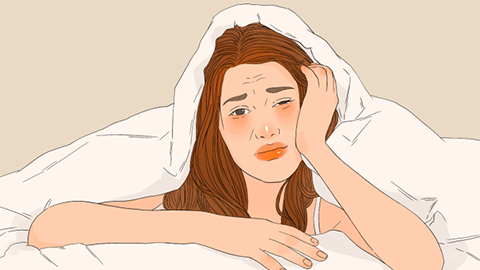What causes sleep disorders, and what should be done about them?
Sleep disorders may be caused by irregular作息, high mental stress, anxiety, depression, neurasthenia, etc., and can be improved through adjusting作息 routines, relieving emotional stress, medication, and other methods. If symptoms persist or are accompanied by headaches or mood disturbances, prompt medical attention is advised.
1. Irregular作息: Long-term熬夜 and inconsistent daily routines disrupt the body's circadian rhythm, leading to difficulty falling asleep and light sleep. It is recommended to establish a fixed schedule, going to bed and waking up at the same time every day, avoiding reversed day-night patterns, and gradually restoring balance to the biological clock.
2. High Mental Stress: Prolonged pressure from work or life keeps the brain in a constant state of tension, affecting sleep quality, causing delayed sleep onset, frequent dreams, and easy awakening. It is advisable to relieve stress through listening to soft music or meditation, and avoid thinking about complex matters before bedtime.

3. Anxiety Disorder: Chronic mental tension leads to excessive worry, resulting in sleep disturbances such as difficulty falling asleep and frequent nighttime awakenings, often accompanied by palpitations and restlessness. Patients may take medications such as estazolam tablets, buspirone tablets, or fluvoxamine tablets under medical supervision to alleviate symptoms.
4. Depression: Abnormal neurotransmitter secretion causes low mood and triggers sleep disorders, characterized by early morning awakening, light sleep, and difficulty returning to sleep after waking. It is recommended to use medications such as fluoxetine dispersible tablets, paroxetine tablets, or sertraline tablets under a doctor’s guidance to relieve discomfort.
5. Neurasthenia: Prolonged overuse of mental energy and chronic stress lead to dysfunction in nervous system regulation, causing sleep problems accompanied by insomnia, vivid dreams, and easy fatigue. Patients may follow medical advice to use medications such as oryzanol tablets, mecobalamin tablets, or diazepam tablets to improve symptoms.
Maintain a quiet and comfortable sleep environment, stay away from electronic devices before bedtime, eat a light diet avoiding spicy or stimulating foods, engage moderately in activities like walking or jogging, and maintain regular作息 to enhance sleep quality.




